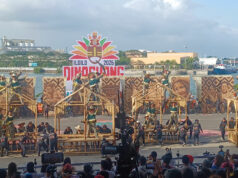Parasite
Directed by Bong Joon Ho
(WARNING: plot twists and story discussed in close and explicit detail)
BONG JOON-HO’s Parasite hums along nicely, a Rube Goldberg thriller whose parts are polished to a shine, slide over and into each other with lubricated precision.
The title sums up the film quite nicely: the struggling Kim family encounters the comfortably situated Park family and one by one the former are able to install themselves in the latter as tutor (Kim son Ki-woo [played by Choi Woo-shik], teaching English to Park daughter Da-hye [Jung ji-so]), art therapist (Kim daughter Ki-jeong [Park So-dam], using art to calm the Parks’ ADHD son Da-song [Jung Hyeon-jun]), housekeeper (Kim matriarch Chung-sook [Jang Hye-jin], cooking for Park matriarch Choi Yeon-gyo [Cho Yeo-jeong]), and chauffeur (Kim patriarch Ki-taek [Song Kang-ho] driving for Park patriarch Dong-ik [Lee Sun-kyon]). The Kims in effect sink their tendrils into the Parks, sucking questionably earned income from the latter’s considerable disposable budget.
Or do they? Bong suggests that the Parks do some leeching of their own, with the young Da-hye throwing herself at Ki-woo, and Ms. Park demanding that Ms. Kim prepare a hot noodle dish (ram-don) in the brief time before the Parks arrive home by car. The dish, a hybrid of two types of instant noodles (manufacturer Nongshim’s Chapagetti, or Chinese-style jajang ramen noodles in black-bean sauce, and Neoguri, Japanese-style udon noodles with a spicy seafood flavor — English translator Darcy Parquet simply used the syllables of the two prime ingredients) topped with Hanwoo, or the Korean equivalent of pricy Wagyu beef (Mr. Parquet opted to for the easier-to-comprehend “sirloin”). Cheap noodles topped with an extravagant luxury item — that’s basically the Park family right there, with a hint of anti-Japanese resentment thrown in (Neoguri being a way of appropriating Japanese udon and making it a Korean staple, culinary retribution for the way the Japanese once colonized Korea and is currently waging a trade war against them).
With the Kims securely installed they suddenly discover they aren’t the first: the Parks’ previous housekeeper Moon-gwang (Lee Jung-eun) has kept her husband Gook Geun-sae (Park Myung-hoon) in a hidden bunker all along, in an attempt to escape loan sharks. Kims battle fellow proles for the privilege of living off the Parks; the Parks, oblivious of the war seething below, continue their pettily eccentric lives.
Upstairs/downstairs comedies and parasitic relationships aren’t anything new — one thinks of Robert Altman’s Gosford Park and before that Jean Renoir’s Rules of the Game; one also thinks — when thinking of social spongers — of Renoir’s Boudu Saved From Drowning and, before that, Moliere’s Tartuffe.
Bong’s Kims aren’t quite like Boudu; they work under false pretenses but they do work, and hard — Dong-ik doesn’t hire Kim-taek straightaway but auditions him first, testing the latter’s driving skills by sitting in the back with a drink in hand (Kim-taek doesn’t spill a drop); Chung-sook swiftly complies with Ms. Park’s demands, producing steaming hot noodles topped with a glossy dark sauce, and slices of decadently fatty beef. On the other hand the Parks aren’t totally contemptible — there’s something poignant about their total defenselessness once the Kims get past the initial defensiveness, the way the rich seem helpless without their servants. Despite the title there’s a symbiotic element to this hilariously knotty relationship.
Moon-gwang seems to have operated the more cunning, more manageable (being simpler) scam, by holding back from the Parks the existence of the bunker, and maintaining her husband in there for years; when the Kims overthrow her, she and her husband fall back to being bottom feeders on a steep ladder, with the bunker door sealed tight shut between the haves and the almost-haves against the have-nots.
That bunker incidentally adds another political angle: the architect (the fictitious Namgoong Hyeonja) built it as protection against a North Korean attack; turns out it would hide a secret that would destroy all three families.
The climax is appropriately chaotic, but two details feel bothersome:
1.) I can appreciate Ki-taek’s resentment of Dong-ik, down to the way the latter’s nose wrinkles when he catches Geun-sae’s smell, and I understand Ki-taek’s anger at Dong-ik prioritizing his son’s trauma over Ki-jeok’s mortal wound, but I still can’t quite buy any of this leading to Ki-taek’s homicidal impulse. Call it a failure of staging, a failure of characterization, or a failure of empathy on my part, but there it is.
2.) I can’t quite appreciate Ki-taek’s ultimate fate. Agree, there’s a beautiful symmetry to where he ends up, but give or take a month (and there seems to be enough provisions in the bunker to hide for at least a month) he can easily sneak out, or get caught in the attempt. That’s not a situation that should last very long, despite Bong’s attempt to present it as otherwise.
A great film? I don’t know; I do consider it great entertainment. Bong has done better I think — the tightening despair of Mother, the haunted ambiguity of Memories of Murder — Bong sails skillfully enough through fantasy and science fiction, but soars in his realist dramas. Parasite doesn’t quite have the chaotic class fury of Luis Bunuel’s Viridiana, with its broadsides at religious hypocrisy (an upstairs-downstairs comedy involving religion would I think work, strangely enough, in puritan America), nor does it have the dance-at-volcano’s-edge metaphorical power of Renoir’s Rules of the Game (arguably the masterpiece of the genre). It does inspire consistent glee, however, and the occasional guffaw, and one drools at the thought of a bowl of shining ram-don noodles with thick slices of Hanwoo beef — of convenience fare elevated, by whatever vulgar means, to the level of haute cuisine. The image alone is worth the price of a ticket.



